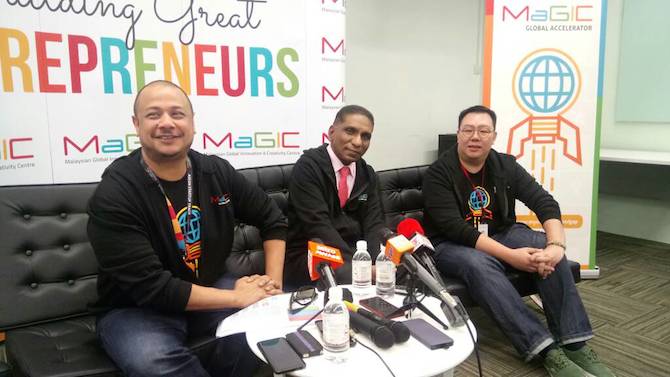MaGIC’s MAP morphs to Global Accelerator Programme, attracts US$22mil in benefits for cohort
By Karamjit Singh July 6, 2017
- Need to think differently, change mindsets to get ahead of the curve
- 56 startups, 200 entrepreneurs, 4-months, sets stage for electrifying ideation

“IT is time for MaGIC to become a global organization, it cannot remain local,” says Mohd Irwan Serigar Abdullah, chairman of MaGIC (Malaysian Global Innovation and Creativity Centre).
And leading its global ambitions is the morphing of its regional accelerator programme, MAP or MaGIC Accelerator Programme into GAP (Global Accelerator Programme).
In his key note Wednesday and subsequent press conference at the kick-off of the four-month GAP, Irwan, who is also the secretary-general of the Ministry of Finance spoke about the changes coming from the digital economy and why Malaysia has to embrace change, adapt and think out of the box.
Part of the change included updating regulations to accommodate the slew of digital disruptors that wanted to enter the markets. Irwan pointed to how regulation needed to be updated and made transparent so that fintech players can enter the market with their services and compete.
“We have to think differently but changing mindsets is the biggest hurdle I am experiencing,” he says. And it’s not just in government but also the corporate sector. “We are always behind the curve and we need to think differently to get ahead of the curve,” he urges, noting that Malaysia is not ranked highly in global innovation indexes.
“Singapore consistently ranks highly but I want us to match them one day. It will happen but will take time,” he declared ambitiously.
For this to happen though, a change in mindset is key and part of thinking differently that Irwan wants to see is a greater desire to work with other governments and with cross border companies.
But he notes that, “people are afraid if they work together with another country, they will lose out and not be competitive with the fear of being dominated by another country. “But that’s all bullshit,” he says, not mincing his words and showing frustration at such myopic and shallow thinking holding back the country.
Reminding participants that MaGIC was created with the mission of ‘Building Great Entrepreneurs’ he urged the 56 startups present from 11 nations to build networks between themselves, exchange ideas and solve regional and global problems. “Create new products, services and technologies and become tomorrow’s successful entrepreneurs,” he encouraged.
With a mix of 60% Malaysian startups and 40% from SEA and the rest of the world, the close proximity of the 56 startups with over 200 entrepreneurs at the MaGIC campus will provide plenty of opportunity for mix and mingling of conversations and electrifying ideation.
They will also have plenty of non-monetary firepower, thanks to the generous contributions from a swathe of corporate partners that sees each startup enjoying US$400,000 worth of products and services. Some are to be used up during the four month programme while others until the credit given is used up.
Output will dictate GAP success, no quota favoring Malaysian startups
With the goal of GAP to become a globally reknown programme, Ashran Ghazi, MaGIC CEO, acknowledges that the GAP output will dictate its success and because of this, there was no quota put on how many Malaysian startups had to be part of the government funded programme.
“We put aside ratios and the team looked at the strength of the ideas during the evaluation process. For example, are their ideas pushing the boundaries of what is currently happening in the space they want to disrupt. And, are we able to help them move up to the next level. It’s a tall order and we can’t just take in someone because of something [a quota].”
At the same time, Ashran has to balance this openness with MaGIC’s mandate to develop local talent and startups and he acknowledges that the current 60:40 ratio has turned out to be a nice balance between the needs to be global in its outlook and delivering on its mandate.
The one key criteria that was central to any startup’s participation in GAP is their desire to penetrate the SEA market. “We were pretty adamant on this point because that is also the uniqueness of our programme – that it is targeted at SEA, a region we know well. Without their commitment to expand their business here, we cannot help them scale,” explains Johnathan Lee, MaGIC executive director of entrepreneurship development.
The startups are clustered into nine verticals, including social innovation, smart cities, healthcare, supply chain, creative & lifestyle, finance, education, e-commerce, and mobile.
GAP provides four months of mentoring from technical and business experts; direct access to route-to-market partners such as Axiata, Digi, Maxis, and Maybank; a co-working space; accommodation; monthly stipend; and benefits worth US$400,000 from Microsoft, Amazon Web Services , IBM, 123RF, HubSpot, and others.
For more technology news and the latest updates, follow us on Facebook,Twitter or LinkedIn.


